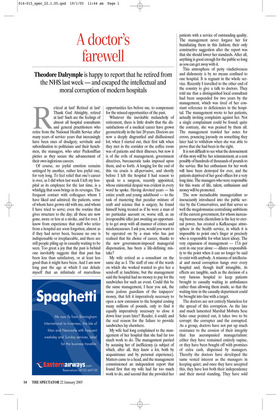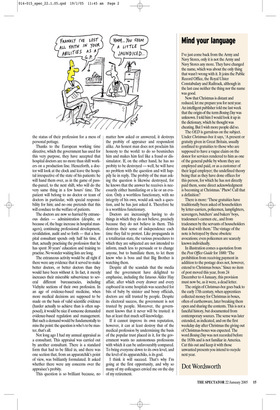A doctor’s farewell
Theodore Dalrymple is happy to report that he retired from the NHS last week — and escaped the intellectual and moral corruption of modern hospitals Retired at last! Retired at last! Thank God Almighty, retired at last! Such are the feelings of almost all hospital consultants and general practitioners who retire from the National Health Service after many years of service: years that increasingly have been ones of drudgery, servitude and subordination to politicians and their henchmen, the managers, who utter Pecksniffian pieties as they secure the advancement of their own inglorious careers.
Of course, no joyful emotion remains untinged by another, rather less joyful one, for very long. To feel relief that one’s career is over, as I did when last week I left my hospital as its employee for the last time, is a whirligig that soon brings in its revenges. The frequent contact with colleagues whom I have liked and admired; the patients, some of whom have grown old with me, and whom I have tried to serve; even the routine that gives structure to the day; all these are now gone, more or less at a stroke, and for ever. I know from experience that staff who retire from a hospital are soon forgotten, almost as if they had never been, because no one is indispensable or irreplaceable, and there are still people piling up in casualty waiting to be seen. Too great a joy that the past is behind one inevitably suggests that that past has been less than satisfactory, or at least less good than it might have been. And I am now long past the age at which I can delude myself that an infinitude of marvellous opportunities lies before me, to compensate for the missed opportunities of the past.
Whatever the inevitable melancholy of retirement, there is little doubt that the dissatisfactions of a medical career have grown geometrically in the last 20 years. Doctors are now a deeply disgruntled and disillusioned lot; when I started out, their first talk when they met in the corridor or the coffee room was of patients and their illnesses, but now it is of the evils of management, government directives, bureaucratic tasks imposed upon them, and so forth. A longing for the end of this via crucis is all-pervasive, and shortly before I left the hospital I had reason to speak to a surgeon, recently appointed, whose existential despair was evident in every word he spoke. Having devoted years — his entire youth and young adulthood — to the task of mastering that peculiar mixture of craft and science that is surgery, he found himself being treated as if he were a man of no particular account or, worse still, as an irresponsible idler just awaiting an opportunity to get away with all manner of crimes and misdemeanours. I ask you, would you want to be operated on by a man who has just realised that his choice of career, thanks to the new government-imposed managerial dispensation, has been a life-defining mistake?
My wife retired as a consultant on the same day as I. The staff of one of the wards on which she worked wanted to give her a send-off at lunchtime, but the management said the hospital had no money to pay for the sandwiches for such an event. Could this be the same management, I hear you ask, the same jealous guardians of the taxpayers’ money, that felt it imperatively necessary to open a new extension to the hospital costing many millions of pounds, only to find it equally imperatively necessary to close it down four years later? Reader, it could; and the real reason for the failure to provide sandwiches lay elsewhere.
My wife had long complained to the management of her hospital that she had far too much work to do. The management parried by accusing her of inefficiency (a subject of which, after all, they knew a lot, both by acquaintance and by personal experience). Matters came to a head, and the management commissioned an independent report that found first that my wife had far too much work to do, and second that she provided her patients with a service of outstanding quality. The management never forgave her for humiliating them in this fashion; their only constructive suggestion after the report was that she should lower her standards. After all, anything is good enough for the public so long as you can get away with it.
This atmosphere of petty vindictiveness and dishonesty is by no means confined to one hospital. It is regnant in the whole service. Recently I travelled to the other end of the country to give a talk to doctors. They told me that a distinguished local consultant had been suspended for two years by the management, which was tired of her constant reference to deficiencies in the hospital. The management wrote to her patients, actually inviting complaints against her. Not a single complainant could be found; quite the contrary, she was praised by them all. The management trawled her notes for errors, pouncing joyously on something they later had to withdraw when she was able to prove that she had been in the right.
It is not difficult to see what the denouement of this story will be: her reinstatement, at a cost possibly of hundreds of thousands of pounds to the service. But her enthusiasm for her work will have been destroyed for ever, and the patients deprived of her good offices for a very long time. The managers who were responsible for this waste of life, talent, enthusiasm and money will be promoted.
The now ineradicable managerialism so insouciantly introduced into the public service by the Conservatives, and that serves so well the megalomaniac centralising ambitions of the current government, for whom increasing bureaucratic clientelism is the key to eternal power, has created a Kafkaesque atmosphere in the health service, in which it is impossible to point one’s finger at precisely who is responsible for what latest idiocy. The very expansion of management — 17.6 per cent in one year alone — dilutes responsibility to the point when it can no longer be said to exist with anybody. A miasma of intellectual and moral corruption hangs over every hospital and, though itself intangible, its effects are tangible, such as the decision of a very famous hospital to keep patients brought to casualty waiting in ambulances rather than allowing them inside, so that the waiting time in the casualty department could be brought into line with a target.
The doctors are not entirely blameless for the spread of this corruption. As the late and much lamented Marshal Mobutu Sese Seko once pointed out, it takes two to be corrupt: the corrupter and the corrupted. As a group, doctors have not put up much resistance to the erosion of their integrity that has accompanied managerialism: either they have remained entirely supine, or they have been bought off with promises of extra cash, dispensed by managers. Thereby the doctors have developed the same vested interest as the managers in keeping quiet; and once they have accepted this, they have lost both their independence and their moral standing. They have sold the status of their profession for a mess of personal pottage.
Thanks to the European working time directive, which the government has used for this very purpose, they have accepted that hospital doctors are no more than shift workers on a production line. Henceforth, a doctor will look at the clock and leave the hospital irrespective of the state of his patients: he will hand them over, as in the game of passthe-parcel, to the next shift, who will do the very same thing in a few hours’ time. The patient will belong to no doctor or team of doctors in particular, with special responsibility for him; and no one pretends that this will conduce to the welfare of patients.
The doctors are now so harried by extraneous duties — administration (despite, or because of, the huge increase in hospital managers), continuing professional development, revalidation, audit and so forth — that a hospital consultant spends only half his time, if that, actually practising the profession that he has spent 30 years’ education and training to practise. No wonder waiting lists are long.
The extraneous activity would be all right if there were any evidence that it served to make better doctors, or better doctors than they would have been without it. In fact, it merely increases their miserable subservience to several different bureaucracies, including Vichyite sections of their own profession. In an age of evidence-based medicine, when more medical decisions are supposed to be made on the basis of valid scientific evidence (harder actually to achieve than is often supposed), it would be nice if someone demanded evidence-based regulation and management. But such a demand would be fundamentally to miss the point: the question is who’s to be master, that’s all.
Not long ago I had my annual appraisal as a consultant. This appraisal was carried out by another consultant. There is a standard form that had to be filled in, and there was one section that, from an apparatchik’s point of view, was brilliantly formulated. It asked whether there were any concerns over the appraisee’s probity.
This question is so brilliant because, no matter how asked or answered, it destroys the probity of appraiser and respondent alike. An honest man does not proclaim his honesty to the world: to do so besmirches him and makes him feel like a fraud or dissimulator. If, on the other hand, he has no probity to be destroyed — well, he will have no problem with the question and will happily lie in reply. The probity of the man asking the question is likewise destroyed, for he knows that the answer he receives is necessarily either humiliating or a lie or an evasion. Only a worthless functionary, with no integrity of his own, would ask such a question, and he has just asked it. Therefore he is a worthless functionary.
Doctors are increasingly having to do things in which they do not believe, precisely because they do not believe in them. This destroys their sense of independence each time they fail to protest. Like propaganda in a totalitarian state, the various procedures to which they are subjected are not intended to inform, much less to persuade or to change anyone, but to humiliate them, to let them know who is boss and that Big Brother is watching them.
Despite all the scandals that the media and the government have delighted to emphasise, including the fatuous Alder Hay affair, after which every drawer and every cupboard in some hospitals was searched for bits of baby by sinister and bossy officials, doctors are still trusted by people. Despite its electoral success, the government is not trusted by people. Moreover, the government knows that it never will be trusted: it has at least that much self-knowledge.
If it cannot improve its own reputation, however, it can at least destroy that of the medical profession by undermining the basis of the popular trust placed in it, for the government wants no autonomous professions with which it can be unfavourably compared. To bring everyone down to its own level, and the level of its apparatchiks, is its goal.
I think it will succeed. That’s why I’m going at the first opportunity, and why so many of my colleagues envied me on the day of my retirement.














































 Previous page
Previous page